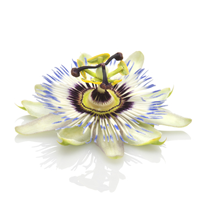 |
Passionflower is the common name for any member of the Passiflora genus, which contains about 500 species. P. incarnata is one of the most common species of passionflower and is also known by many other names such as maypop, true passionflower, purple passionflower and wild apricot.
Passionflower originates from the southeastern United States, where it often grows wild in large numbers. It typically grows in open areas with direct sunlight, including meadows, unmowed pastures and disturbed areas. Passionflower doesn’t grow under forest canopies.
Passionflowers are fast-growing perennials with long, trailing vines. The leaves typically have three lobes and usually grow to between 2.5 and 6 inches. The flowers are bluish-white with five petals and a purple or white corona. Passionflowers are self-sterile, meaning they unable to pollinate themselves. They must therefore be pollinated by insects, usually carpenter bees and bumblebees. Passionflowers have large stamens and styles due to their role as host plants for the larvae of many species of butterflies, especially the Gulf fritillary and zebra longwing. Many other types of wildlife eat the fruit of the passionflower, which is a fleshy berry about the size of an egg.
Passionflowers are commonly used in traditional herbal medicine, both as a fresh and dried plant. It is typically made into a tea, and some chewing gums also contain passionflower extract. Passionflowers are typically used to relieve insomnia and anxiety. Several animal studies have established passionflower extract’s anxiolytic properties. Some researchers believe that the active component in passionflower extract is some type of benzoflavone, although it has not yet been isolated. This component may also effective against coughing that is caused by compounds containing sulfur dioxide.
Uses of Passionflower
The uses of passionflower extract in modern herbal medicine generally relate to its calming effects. It may also be useful in relieving withdrawal symptoms.

Signs You May Need Passionflower
Anxiety is one of the most common signs that you may need passionflower extract, as taking it may help to relieve restlessness and insomnia. Emotional stress and muscle tension that cause discomfort are also indications that passionflower extract may be beneficial.
Other signs you may need passionflower extract include poor heart rate patterns, poor blood pressure levels and some nervous disorders. You may also want to take passionflower extract if you are experiencing withdrawal symptoms.
|

 Total Women's Health
Total Women's Health  Total Balance - New Immunity Blend
Total Balance - New Immunity Blend  The Science of Digestion
The Science of Digestion 
 Total Women's Health
Total Women's Health  Total Balance - New Immunity Blend
Total Balance - New Immunity Blend  The Science of Digestion
The Science of Digestion